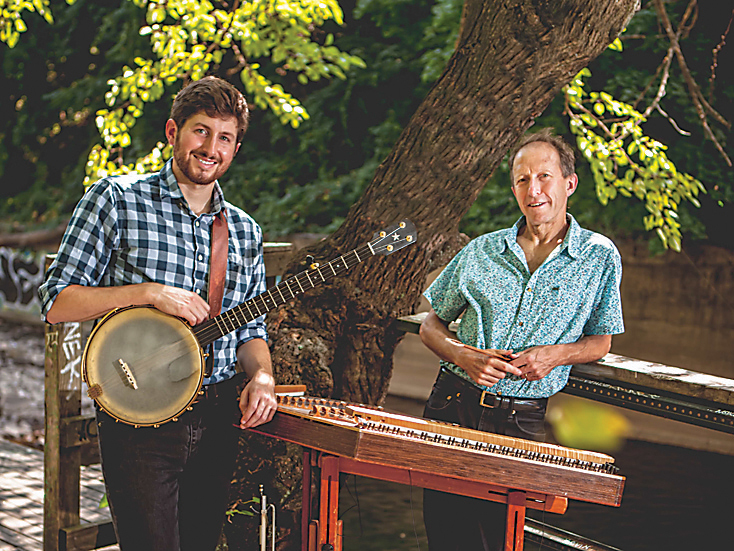Arts & Culture
Q&A with Ken and Brad Kolodner
We chat with the father-son duo about their new album, The Swift House.
Folk music has deep roots in the Land of Pleasant Living, with bluegrass, folk, and Old-Time music stretching back to the earliest days of Appalachia. Father-and-son duo Ken and Brad Kolodner take that legacy to the next level, combining Ken’s lauded experience with Brad’s rising talent to create a homegrown sound that carries on the local tradition in not just their own family but also the greater Baltimore community. We talked with the team about falling into folk music, its effect on their relationship, and the importance of musical stewardship. Catch them live at the Creative Alliance on April 15.
How did you get into playing music?
Ken: I always loved music but through my later years of high school and college, especially in the summers, I would go to fiddlers’ festivals. It looked like people were having so much fun playing music together, and I thought perhaps that’s something I could do.
My goal when I first picked up the fiddle was that it would be great if I could someday play music with other people. I picked it up just before grad school at Johns Hopkins, and within a couple years I was playing music with all sorts of folks and decided that was a great way to spend my life.
And Brad?
Brad: I listened to some of the recordings from my father’s previous band, Helicon, so I certainly enjoyed music, but I didn’t express any interest in trying to play. Nor was it ever pushed on me. I played the cello as a requirement when I was a student at Friends School but I didn’t really start playing folk music until my senior year of high school when I went to a music camp and signed up for a banjo class. It sounded interesting. I thought I might as well just give it a shot.
What was it about the banjo that made you decide to steer in that direction?
Brad: I knew it was going to be a pretty easy way to become a millionaire. [Laughs]. No—I just liked the way it felt in my hands and in my fingers. I was particularly attracted to the way my first banjo teacher, Richie Stearns, approached the instrument. It was very unique, very groovy. I picked it up pretty quickly and I’ve just enjoyed it ever since.
As father and son, how has performing together influenced your music and your relationship?
Brad: We spend a lot of time together, which is really nice in many ways. The band isn’t going to break up, per se. We have a lot of shared experiences and common interests. It’s different working with my dad and working with friends but that being said, any kind of close-knit band has a familial feel to it.
Ken: In every musical relationship, you have to learn how to communicate with each other, to say what you like about each other’s performance and what doesn’t work, and to be respectful. I’ve been in bands and had many musical partners over the years where you evolve that relationship. With Brad, same thing, but we already know how to talk to each other. The one thing I had to learn was to not be the guy in charge, and recognize that Brad has his own musical vision and to let him express that.
Brad: Those first couple of years, I was certainly latching on and trying to soak in as much as I could, and I still do, but now there are certain components of the music and the business side of doing this for a living that we learn from each other. I’d say it’s a pretty equal two-way street.
How has it felt to watch Brad grow as a musician?
Ken: It’s been wonderful to watch. I remember in the early days when I would bring him up on stage, my wife would say, “Is he ready for this?!” And I would say, “Yeah, he’s ready—he’s good!” I said to her a couple of times that I thought he was going to be really good, eventually. I trusted him performing on stage in those early days.
At first he was a little scared, a little stiff, but that’s normal. Now his stage presence is fantastic. I’ve really seen his confidence as a player emerge. As a musician, you hope you never stop developing and growing, and it’s great to see that happening when it’s on stage with you and it’s your own son.
Brad: I am grateful for those early experiences with musicians who were far better than me. You learn a lot, being thrown into the fire.
Now you’re an important part of the local folk scene.
Brad: There’s a whole network of old-time and folk musicians in Baltimore that we’re really grateful to be a part of. We’ve been working really hard to see that community grow, be it with the old-time jam we run at the Five & Dime Ale House in Hampden, or the Baltimore Square Dance I help organize, or the house concerts we help put on. It feels like a responsibility of ours to help keep it alive.
Ken: For me, it’s very gratifying to see so many young players and young folks interested in the music.
Brad: It’s becoming a bluegrass and old-time and folk music town again.
